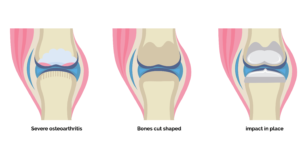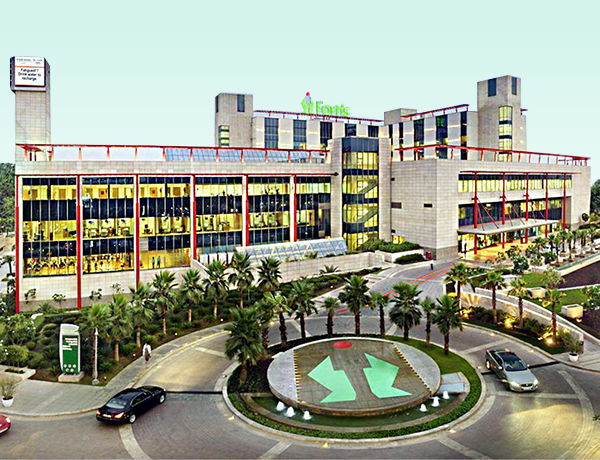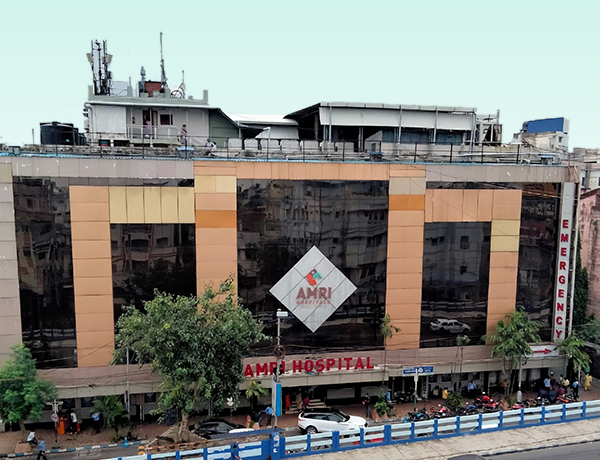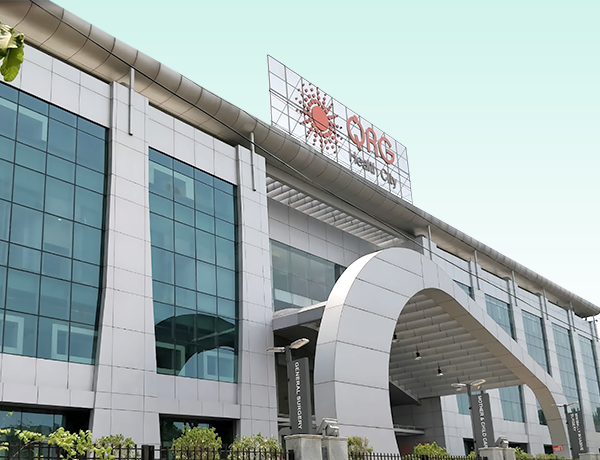Total Knee Replacement-Bilateral
Total Knee Replacement, also known as Total Knee Arthroplasty, is a surgical procedure performed to replace damaged or severely worn knee joints with artificial implants. Bilateral Total Knee Replacement involves replacing both knee joints during the same surgical procedure. This procedure is typically recommended for individuals who have significant arthritis or joint degeneration in both knees, resulting in pain, stiffness, and limited mobility.

Who Needs Total Knee Replacement – Bilateral
Bilateral Total Knee Replacement may be recommended for individuals who experience the following:
- Severe Knee Pain: Persistent knee pain that does not respond to non-surgical treatments such as medications, physical therapy, or injections.
- Loss of Function: Difficulty performing daily activities such as walking, climbing stairs, or getting up from a chair due to knee pain and stiffness.
- Advanced Arthritis: Advanced osteoarthritis or rheumatoid arthritis that has resulted in significant joint damage, deformity, and joint space narrowing in both knees.
- Bilateral Knee Degeneration: Degenerative changes that affect both knees simultaneously, causing pain and affecting the overall quality of life.
When to See a Specialist
If you experience persistent knee pain, swelling, stiffness, or difficulty performing daily activities due to knee problems, it is recommended to see a specialist. They can evaluate your condition, conduct diagnostic tests such as X-rays and MRI scans, and determine if Total Knee Replacement – Bilateral is a suitable treatment option for you.
Procedure
- Preoperative Assessment: The surgeon will perform a thorough evaluation, review medical history, and conduct imaging tests to assess the condition of both knee joints.
- Anesthesia: General or regional anesthesia will be administered to ensure your comfort during the surgery.
- Incision: The surgeon will make incisions on both knees to access the knee joint.
- Joint Preparation: The damaged cartilage and bone surfaces of both knee joints will be removed.
- Implant Placement: Artificial joint components, including metal and plastic implants, will be securely attached to the ends of the thigh bone, shin bone, and kneecap.
- Closure: The incisions will be carefully closed using sutures or staples.
- Postoperative Care: You will be monitored in a recovery area and then transferred to a hospital room for postoperative care, pain management, and rehabilitation.
Road to Recovery
Recovery from Bilateral Total Knee Replacement requires a comprehensive rehabilitation program that includes physical therapy, pain management, and mobility exercises. The timeline may vary for each individual, but it typically involves the following stages:
- Hospital Stay: Most patients will remain in the hospital for a few days following surgery.
- Rehabilitation: Physical therapy and exercises will begin soon after surgery to improve range of motion, strength, and mobility.
- Outpatient Rehabilitation: After being discharged from the hospital, regular outpatient physical therapy sessions will be scheduled to continue rehabilitation and optimize recovery.
- Return to Normal Activities: With time and dedication to the rehabilitation program, patients can gradually return to normal activities and enjoy improved knee function.
Risk Management
Although Total Knee Replacement – Bilateral is a safe and effective procedure, there are some risks involved, including infection, blood clots, implant loosening, nerve damage, and limited range of motion. Following the surgeon’s instructions, attending rehabilitation sessions, and maintaining a healthy lifestyle can help minimize these risks.
Benefits of Total Knee Replacement – Bilateral
- Significant Pain Relief: Bilateral Total Knee Replacement can provide significant pain relief, enabling individuals to engage in activities they were previously unable to perform.
- Improved Mobility: The procedure can restore joint function and improve mobility, allowing individuals to walk, climb stairs, and participate in physical activities with greater ease.
- Enhanced Quality of Life: By alleviating pain, improving mobility, and restoring function, Bilateral Total Knee Replacement can greatly enhance an individual’s overall quality of life and independence.
Frequently Asked Questions
1. How long does the recovery process take after Bilateral Total Knee Replacement?
The recovery process can vary, but it typically takes several weeks to a few months. Full recovery and return to normal activities may take up to six months or longer.
2. Will I be able to bend my knees fully after Bilateral Total Knee Replacement?
The range of motion in the knees can improve significantly after surgery. However, the extent of improvement can vary from person to person. Regular physical therapy and exercises can help optimize knee flexibility.
3. Are there any restrictions or precautions after Bilateral Total Knee Replacement?
While there may be some restrictions initially, such as avoiding high-impact activities, most individuals can gradually resume normal activities with the guidance of their healthcare team. It is important to follow the surgeon’s instructions and recommendations for optimal recovery.
4. How long do the knee implants last?
The longevity of knee implants can vary depending on factors such as patient age, activity level, and implant design. In general, modern knee implants can last for 15 to 20 years or more with proper care and regular follow-up with your orthopedic specialist.
Treatians As The Best Choice
Treatians understand that seeking medical treatment abroad can be a daunting experience for patients and their families. That’s why the company offers end-to-end support to its clients, from the initial consultation to post-treatment care. The company provides personalized treatment plans that are tailored to meet the individual needs of each patient, and its team of dedicated professionals is always on hand to provide guidance and support throughout the entire process. Contact us at +91-7982312582, drop your email [email protected]
- Trauma & intensive care
- Aged Care
- Community Services
- Diagnosis & Investigation
- Medical & Surgical
- Mental Health
- Rehabitation
- Specialised Support Service



















